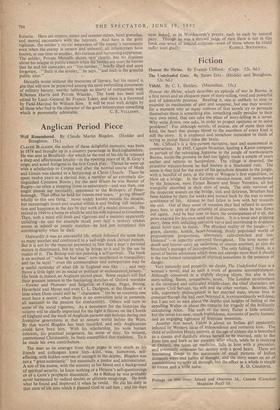• Anglican Period Piece
CLAUDE BLAGDEN, the author of these delightful memoirs, was born in 1874 and brought up in a country parsonage in Buckinghamshire. He was sent to Bradfield—for which to the end of his life he retained a deep and affectionate loyalty—in the opening years of H. B. Gray's reign, and acted Antigone in the first Greek play. Thence he went up with a scholarship to Corpus and after the normal course of Mods and Greats was elected to a lectureship at Christ Church. There he spent twelve years as a clerical don, a member of an extremely dis- tinguished Common Room_; for the next fifteen he was Rector of Rugby—so often a stepping stone to episcopacy—and was then, one might almost say inevitably, appointed to the Bishopric of Peter- borough. That office he held for twenty-two years, " giving hitnself wholly to this one thing," never widely known outside his diocese, but increasingly loved and trusted within it and finding full satisfac- tion and happiness in the day by day work of a model diocesan. He retired in 1949 to a home in which he and his wife rejoiced at Grasillere. Then, with a mind still fresh and vigorous and a memory apparently unfailing—he can for example recall over half a century cricket scores at school or county matches—he had just completed this autobiography when he died.
Outwardly it was an uneventful life, which folloWed the same lines as many another and conformed to a well-nigh stock clerical pattern. But it is not by the material presented to him that a man's personal stature is determined, but by what he brings to it and by the use he makes of it. The Bishop was not painting a self-portrait. The book is an account of "what he had seen" now recollected in tranquillity; and (as he says) " even the commonplace and unimportant may be a -useful reminder of what life in England was like . . . and may throw a little light on its social or political or ecclesiastical history." His book is, indeed, an Anglican period piece. Some readers will find their greatest interest in the fascinating sketches of Oxford worthies —Fowler and Plummer and Sidgwick at Corpus; Paget, Strong, Haverfield and Myres and even C. L. Dodgson, at the House—at a time when Dons could still be "characters " (to be an eccentric one must have a centre ; when there is no conviction held in common, all succumb to the passion for conformity). Others will turn to some of the social vignettes, As a document for the historian the volume will be chiefly important for the light it throws on the Church of England and the work of Anglican parsons and bishops during two formative generations in that so remote world before the Wars. By that world Blagden has been moulded, and only Anglicanism
• could have bred him. With his scholarship, his wide human interests, his practical judgement, his sense of duty, his reticent, unemotional Christiantity, he finely exemplified that tradition. To it he made his own contribution.
The man as he emerges from these pages is very much as his friends and colleagues knew him—kind, wise, humorous, self- effacing, with hidden reserves of strength in the depths. Blagden was not a " great ecclesiastic" but essentially a pastor and administrator. A son of the manse, with the ministry in his blood and a background of spiritual security, he knew nothing of a Henson's self-questionings or of a Gore's prophetic discontent. As a Bishop he was probably never tormented by radical doubts or ultimate misgivings. He took what he found and improved it when he could. He did his duty in that state of life into which it pleased God to call him ; and his days were linked, as in Wordsworth's prayer, each to each by natural piety. Though he was a shrewd judge of men there is not in this book one-word of unkind criticism—even of those whom he could


















































 Previous page
Previous page